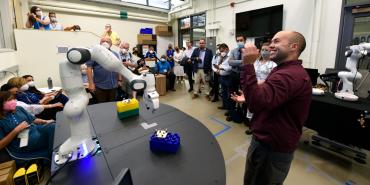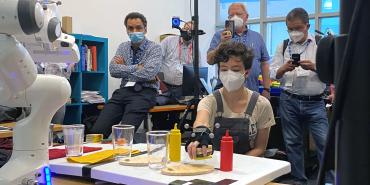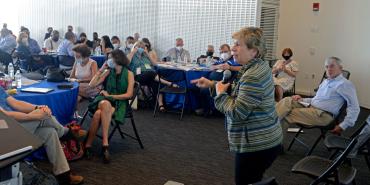We are in the middle of a technological revolution that is transforming the way we live and work. From hiring processes that are machine-guided to GPS devices tracking activities to the growing use of robotics in healthcare, artificial intelligence is increasingly guiding decision-making and the delivery of public services—including education.
What role should unions play in ensuring that our work and our data are used for the common good? This is the question AFT leaders and guests from around the world took up during a daylong event July 13 at the Massachusetts Institute of Technology in Boston.
“Technological Frontiers and Worker Empowerment,” cohosted by MIT’s Institute for Work and Employment Research, the Albert Shanker Institute and the AFT International Affairs department, emphasized that the future of work is union work. In all its projects and research, this MIT institute emphasizes its commitment to building trustworthy and socially responsible artificial intelligence systems, which is key to protecting workers.
In the morning, AFT leaders and about 80 international guests—the largest international delegation ever to attend an AFT convention—toured two MIT robotics labs to see firsthand several developments in artificial intelligence. AFT and global union leaders peppered MIT engineers with questions about both the science and the applications—for instance, how quickly their robots can take in and process new information, such as motion capture, to perform “simple” tasks like setting a table or making sandwiches.
The afternoon featured two panel discussions, one on international policy frameworks and ethical guidelines, and the other on what union leaders need to know in order to negotiate on behalf of their members. Among other things, the union leaders discussed how artificial intelligence can be developed in collaboration with workers to strengthen professional roles within education, public services and healthcare.
Participating AFT leaders included AFT President Randi Weingarten, Melissa Cropper of the Ohio Federation of Teachers, Jan Hochadel of AFT Connecticut and Dan Montgomery of the Illinois Federation of Teachers. Among many international speakers, the group heard from Gabriela Ramos of UNESCO, on the ethics of artificial intelligence; Stéphan Vincent-Lancrin of the Organization for Economic Cooperation and Development, on anticipating student absenteeism and designing interventions; and MIT professor Eric Klopfer, about the value of games.
MIT professor Thomas Kochan, the day’s host, introduced Weingarten by offering his favorite quote from her: “At the AFT, we have historically said we can’t be afraid of technology but we have to know how to use it, and to know how to use it, we have to have a voice in it. … If you are not on the ground floor and part of the design, and discussing what goal the technology is addressing, it is always a matter of catch-up and dealing with what the technology is doing to you rather than how to work with these tools.”
Weingarten then spoke to the group, emphasizing that the future of work is union work and there’s no time to wait: Unions must fight against the exploitation of workers and the deterioration of free, democratic societies.
She noted that our friends in Europe are already reining in tech firms. The European Union’s Digital Services Act includes reporting requirements to help the public hold companies accountable for misinformation. But it’s no easy task. Sometimes, Weingarten said, social media makes us feel as though our children are swimming among sharks. But she left the group on a positive note. “Joy is an act of political and spiritual resistance,” Weingarten said. “The corollary is that despair, apathy and cynicism are tools of the autocrat.”
Today also marked the launch of a special edition of the New England Journal of Public Policy on the future of work in education and public service, featuring articles by several of today’s attendees.
[Annette Licitra/photos by Michael Campbell]



